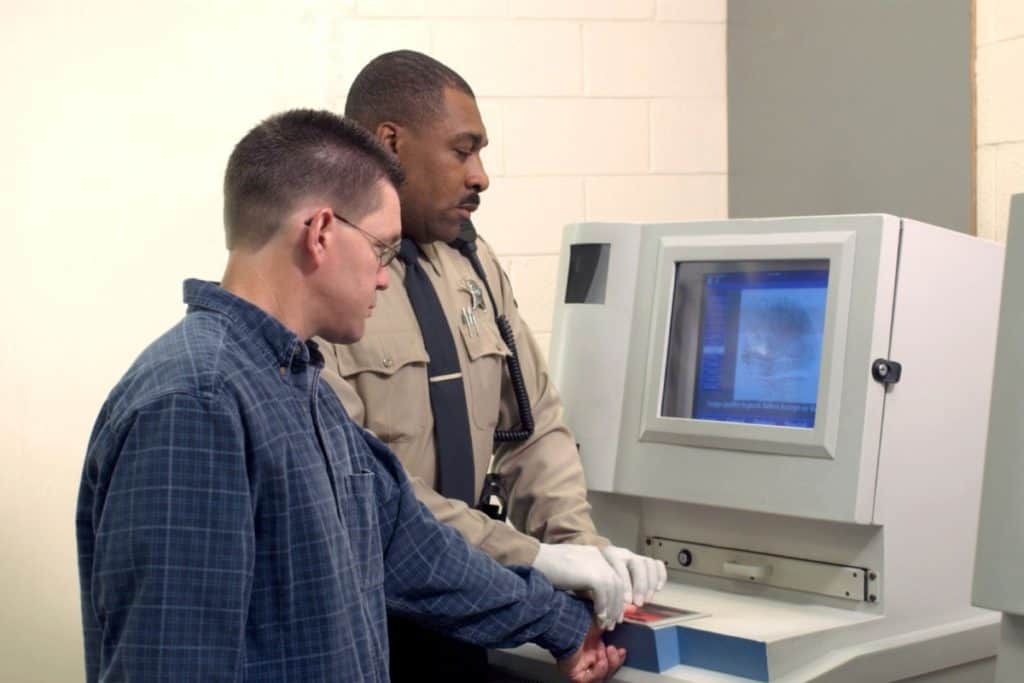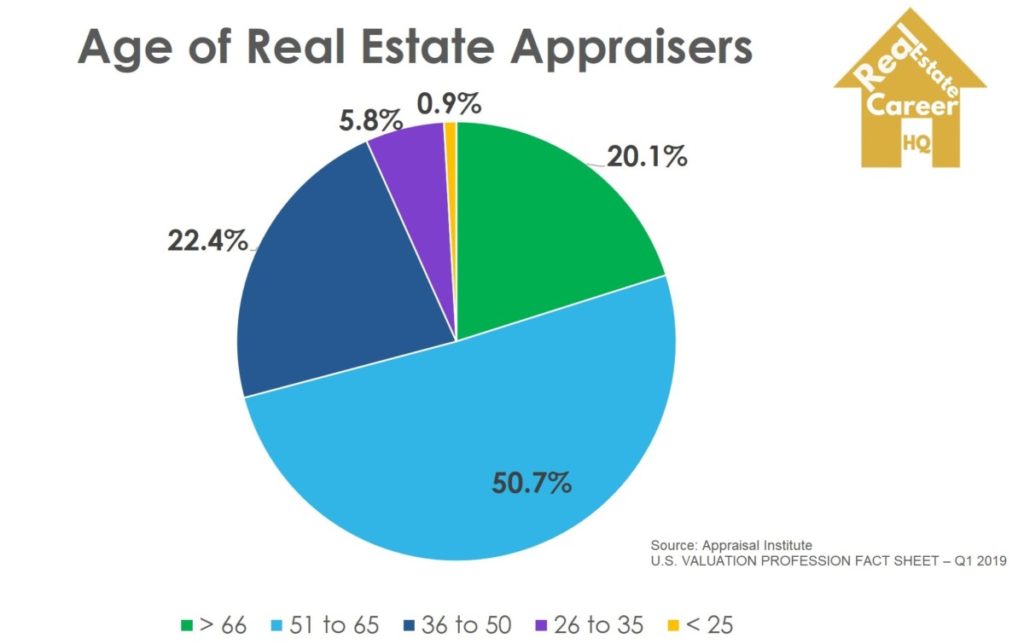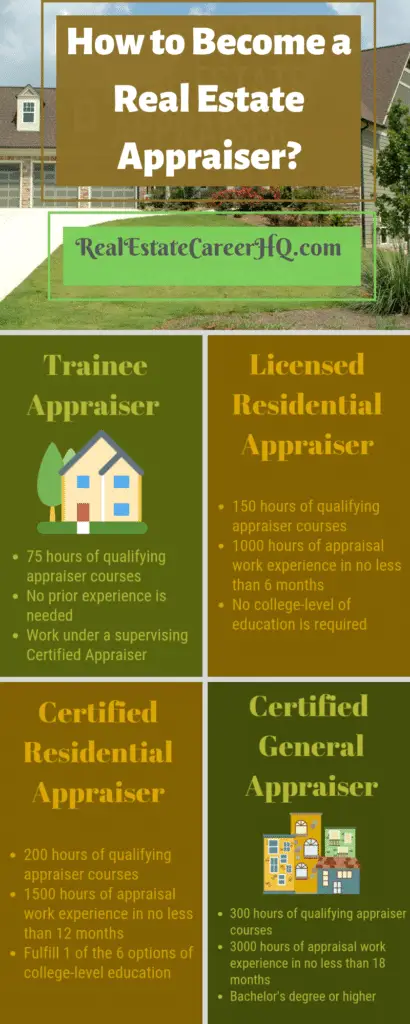(**) Disclosure: This post may contain affiliate links, meaning RealEstateCareerHQ.com will get a commission if you decide to make a purchase through the links, but at no additional cost to you.
To become a real estate appraiser, you must fulfill all requirements imposed by the Appraisal Qualification Board (AQB). This includes completing qualifying appraisal courses, submit an application to the State Appraisal Board, work under the supervision of a Certified Appraiser, obtain appraisal work experience hours, and pass the National Uniform Licensing and Certification Examination.
In most states, there are 4 license levels of real estate appraisers. They are:
- Trainee Appraiser
- Licensed Residential Appraiser
- Certified Residential Appraiser
- Certified General Appraiser
As a real estate appraiser, your role is to determine an unbiased and objective opinion about properties’ market value.
There are over 325 million people in the United States. Every day, many people buying or selling houses, relocating, refinancing their home, getting divorced, settling their estate, assessing their property tax, and negotiating their lease. Your appraisal work is essential in all these scenarios.
In this article, you will find out the steps to become a real estate appraiser, how long it takes, and the appraisal courses and exam requirements. I’ll also go through the income figures of appraisers in different niches and FAQ about this profession.
To give you a better idea about this industry, I talked to numerous real estate appraisers. I’m sure their feedback can give you a clear direction on whether it is the right career path for you.
Before we start, I want to give you a heads up that the requirements on this page are the minimum criteria established by the Appraisal Qualification Board (AQB). However, every state can impose additional licensing requirements. So you should always check with your State Appraisal Board for exact details.
A Table Summary to Become a Real Estate Appraiser
| Licensing Requirement | Qualifying Appraisal Courses | Work Experience | College-Level Education |
|---|---|---|---|
| Trainee Appraiser | 75 hours | Work under supervision of a Certified Appraiser | None |
| Licensed Residental Appraiser | 150 hours | 1000 hours | None |
| Certified Residential Appraiser | 200 hours | 1500 hours in no less than 12 months | Fulfill 1 of the 6 options of college-level education |
| Certified General Appraiser | 300 hours | 3000 hours in no less than 18 months | Bachelor’s degree or higher |
8 Steps to Becoming a Real Estate Appraiser

Step 1: Meet the eligibility requirement
- You must be at least 18 years of age
- Have a valid Social Security Number. If you don’t have an SSN, you could visit this website to obtain one.
- Complete the college-level requirements specified for each license level
Step 2: Satisfy the College-Level Education Requirement
| Trainee | Licensed Residential Appraiser | Certified Residential Appraiser | Certified General Appraiser | |
|---|---|---|---|---|
| College-Level Education Requirements as of May 1st, 2018 | None | None | Please refer to the "6 Options for Certified Residential Appraiser" | Bachelor's degree or higher |
Here are the 6 College-Level Options for Certified Residential Appraiser. You just need to complete one of them:
- Option#1: Hold an associate’s degree in either Accounting, Business Administration, Economics, Finance, or Real Estate; OR
- Option #2: Hold a bachelor’s degree in any field of study
- Option #3: Complete 3 hours of each of the following college-level courses with a total of 30 semester hours
- Algebra, Geometry, or Higher Math
- Computer Science
- English Composition
- Finance
- Macroeconomics
- Microeconomics
- Real Estate Law or Business Law
- Statistics
- 2 elective courses (3 hours each) in any of the above subjects or in Accounting, Agricultural Economics, Business Management, Geography, or Real Estate;
- Option #4: Complete 30 hours of College Level Examination Program® (CLEP®) examinations that cover each of the subjects in Option #3
- Option #5: Any combinations of Option #3 and Option #4 which consists all the topics mentioned above
- Option #6: If you have been a Licensed Residential Appraiser for 5 years or more, while your license is in good standing, then the college-level requirements can be waived.
(Is a college-degree really necessary for this profession? Here is another post I wrote on this topic. In there, you will find what appraisers think about getting a college-level education for this profession.)
Step 3: Fulfill the qualifying appraisal education
You are required to complete a minimum amount of appraisal-related education to obtain an appraiser license. These courses must be administered by an approved course provider and taken within 5 years immediately before the date of application.
National Standard of Appraiser Qualifying Education
| Trainee Appraiser (Credit Hours) | Licensed Residential Appraiser (Credit Hours) | Certified Residential Appraiser (Credit Hours) | Certified General Appraiser (Credit Hours) |
|
|---|---|---|---|---|
| National USPAP Course or Equivalent | 15 | 15 | 15 | 15 |
| Basic Appraisal Principles | 30 | 30 | 30 | 30 |
| Basic Appraisal Procedures | 30 | 30 | 30 | 30 |
| Residential Market Analysis and Highest & Best Use | 15 | 15 | ||
| Residential Appraisal Site Valuation and Cost Approach | 15 | 15 | ||
| Residential Sales Comparison and Income Approaches | 30 | 30 | ||
| Residential Report Writing and Case Studies | 15 | 15 | ||
| Statistics, Modeling and Finance | 15 | 15 | ||
| Advanced Residential Applications and Case Studies | 15 | |||
| General Appraiser Market Analysis and Highest & Best Use | 30 | |||
| General Appraiser Sales Comparison Approach | 30 | |||
| General Appraiser Site Valuation and Cost Approach | 30 | |||
| General Appraiser Income Approach | 60 | |||
| General Appraiser Report Writing and Case Studies | 30 | |||
| Appraisal Subject Matter Electives | 20 | 30 | ||
| Total | 75 hours | 150 hours | 200 hours | 300 hours |
In addition to the courses mentioned above, many states would require you to take the supervisory/trainee course before becoming a Trainee Appraiser.
Also, some states require more hours of class time to obtain the trainee license. For instance,
- Georgia, Kentucky, North Carolina, Tennessee: 90 hours of qualifying education
- Florida: 100 hours of qualifying education
- Colorado: 110 hours of qualifying education
- California, New York, West Virginia: 150 hours of qualifying education
These extra coursework requirements could apply to other levels of licenses too. For example, you must complete 200 hours of courses to become a Licensed Residential Appraiser in North Carolina, where most states only requires 150 hours.
Therefore, make sure you check with your State Appraisal Board to find out the specific course requirement.
Study tip: Whenever possible, I prefer to take online courses. You can study at your own pace at the convenient of your home, library, or wherever there is internet access. Here’s an article review of an online school that I like.
Step 4: Accumulate the required hours of appraisal work experience

Gaining your knowledge only from textbooks is not enough, you are required to obtain hands-on experience by working in the appraisal field. Each level of licenses would require different hours of working experience.
When you first start out as a “Trainee Appraiser”, you must work under the supervision of a Certified Appraiser. A knowledgeable and experienced mentor could guide you in the right direction in the appraisal career. The supervisory appraiser should teach you:
- Effective appraisal tactics (i.e: Income, cost, and sales comparison approached)
- How to make a proper adjustment? (i.e: external or functional obsolescence)
- What to include in an appraisal? (i.e: photos)
- Where to obtain data about a property?
- How to extract meaningful information from the data?
This hands-on training is to equip you with sufficient knowledge so that you can confidently and accurately take on appraisal assignments in the future.
Remember to keep track of the working hours for each appraisal assignment!

Every state has its own standard experience log sheet. Usually, you can download it from the State Appraisal Board website. This document will be needed when you are upgrading your license in the future.
When you work as a Trainee Appraiser, both you and your supervisor need to sign all the pages on the experience log sheet. But make sure to do it immediately after each assignment.
A Trainee Appraiser once told me that he was planning to get his supervisor to sign all his previous log sheets. However, his supervisor left the firm unexpectedly. This made it very challenging for the trainee to validate the work hours.
[Read: What to look for and expect from a supervisory appraiser?]
Work Experience Requirement for Each Level of Appraisal License
| Trainee | Licensed Residential Appraiser | Certified Residential Appraiser | Certified General Appraiser | |
|---|---|---|---|---|
| Hours of Appraisal Work Experience Required | None | 1000 hours | 1500 hours | 3000 hours |
| Minimum Period that Working Experience is Obtained | N/A | 6 months | 12 months | 18 months |
Once again, each state could have a slightly different requirement from others.
For example, when you are gaining the first 500 hours of work experience as a Trainee in Illinois. Your supervisor needs to spend the time to inspect a minimum of 25 properties with you. Your mentor is required to be physically present for each inspection.
Not all appraisal work experience is the same

When you are pursuing the Certified General Appraiser license, you need to complete 3000 hours of appraisal work.
Since the CG license allows you to appraise any real estate regardless of values or types, the State Appraisal Board typically requires at least half of the 3000 hours to be performed on non-residential properties.
Is commercial real estate appraisal a good career? Check out this complete guide. In it, you’ll find the type of work involved as a commercial real estate appraiser, the income potential, and the training you need to have to become one.
Step 5: Submit application to the State Appraisal Board

After you have fulfilled all the education and working experience requirements, your next step is to submit an appraiser license registration form to the “Real Estate Appraisers Board” in your state.
It is the regulatory body that establishes the industry standard, regulates, and issues the license for appraisers. Some states would call it “Real State Commission,” ” Real Estate Board,” or other similar variations, but their key functions are the same.
Once again, you can download the application from their website. In addition, you need to provide the following:
- Registration fee
- Supporting legal documents
- Evidence which shows you have completed the required qualifying education. (i.e., Official transcripts, course completion certificates).
- Proof that you have completed the specific requirement of college-level education for your license (i.e., Diploma, official transcripts, certificates.)
- Appraiser Experience Log (Only if you are applying to become Licensed/Certified Appraiser)
Then you can send the entire set of documents to the State Appraisal Board. Their mailing address usually can be found on the application.
Some states departments have the option for you to apply online. In fact, some would even give you a small discount (i.e., $20) on the registration fee in doing so.
Step 6: Perform a background check

The State Appraisal Board needs to make sure that you are a person with credibility, truthfulness, and integrity to fulfill the position’s responsibilities. In most states, they would perform a criminal background check on you.
After you submit the application, you would provide a fingerprint. Typically speaking, you would contact an approved vendor and get this done at their office. There will be an additional fee for submitting the fingerprint.
Keep in mind that there could be a deadline. For example, if you are applying for an appraiser license in Texas, you must provide the fingerprint within 12 months that the regulator receives the application. Else the application will be expired. And it could take a few weeks to get the result.
Step 7: Pass the National Uniform Licensing and Certification Examinations

The purpose of the exam is to see how well you know the materials from the appraisal courses. It will cover topics such as:
- Real estate market
- Property description
- Land or site valuation
- Sales comparison approach
- Cost approach
- Income approach
- Reconciliation of value indications
- Uniform Standards of Professional Appraisal Practice
Upon acceptance of your application, the Appraisal Board will send you an approval notice with instructions to schedule the exam writing.
- Licensed Residential Appraiser Exam is a 4 hours exam,
- Certified Residential Appraiser Exam is a 4 hours exam,
- Certified General Appraiser Exam is a 6 hours exam
They all consist of 125 questions. Only 110 questions will be scored, the other 15 are pretest questions. The passing score is 75, and many test administer can let you know the result once you finish writing the exam.
The key is to get your qualifying education from a trusted course provider and do as many practice questions as you can from different study guides. Not only this would help you to get a sense of what will be tested, but it will also boost your confidence.
Here are some practical tips to prepare for the appraiser exam!
You might get nervous while writing the exam, which could affect your performance. I suggest you get at least 85% correct answers on the practice questions before you enter the exam room. This should give you a significant buffer on the confidence level.
Furthermore, cramming for the exam is ineffective. Instead, you should study for 45 to 60 minutes, then take a break. Concentration tends to wander if you study for too long. If possible, focus on studying only one to two topics per day. But be really good at it.
Get enough sleep the night before the exam and have a good meal before it. Managing your stress level during the test is another key to passing it.
(Also, be sure to check out my other post: “10 Practical Tips to Pass the Appraiser Exam on the First Try“. In there, you will find the weighting of each exam topic, sample questions, and the passing rates throughout the years.)
Step 8: Maintain the appraisal license
Some states would require you to renew your license every year, while others are every other year. Regardless of the renewal schedule, you still need to complete the continuing education courses. This ensures that you are keeping up to date with the appraisal knowledge and regulatory changes.
The required CE credits would work out to be approximately 14-course hours per year.
Here are the top ten continuing education courses that I genuinely think could enhance your appraisal knowledge. I included the courses’ description, their length, and price. Make sure you check out number 5!
How much does it cost to get an appraiser license?

It could cost cost approximately $1,360 to $4,400 to get an appraisal license. The higher the level of a real estate appraiser license, the more it would cost. For example, the Certified General Appraiser is the most sophisticated license and will require the greatest investments.
Here’s the breakdown of the cost to get an appraisal license:
The fees for the registration and background are around $200, and the exam fee is roughly $130.
As for the appraisal courses, I checked with an education provider. Their online courses are priced around:
- $210 for a 15-hours course
- $410 for a 30-hours course
- $780 for a 60-hours course
If you take courses individually, then the tuition would cost approximately:
- $1,030 for the Trainee Appraiser
- $2,070 for the Licensed Residential Appraiser
- $2,490 for the Certified Resident Appraiser
- $4,070 for the Certified General Appraiser
However, some of the courses are duplicated among different license levels. For example, you would have already taken some of the Licensed Residential Appraiser courses when you were becoming a Trainee. Therefore, you only need to pay an extra ($2070 – $1030)= $1,040 to complete the remaining classes.
Furthermore, I’ve seen an education provider offering appraisal courses in a bundle. With one discounted price, you could access to course materials of all license levels for an entire year. This could be a massive saving if you eventually plan to become a Certified Appraiser.
The first step to your appraisal career is to complete the pre-licensing courses from a trusted education provider. McKissock received an incredible rating from its students, and their online lessons are taught by instructors who have actual experience in the appraisal industry. You may click here to find out more about their courses. (**)
How long does it take to become a real estate appraiser?

It takes approximately six months to two years to become a real estate appraiser. The broader the scope of work that a license permits, the greater the course loads and work experience hours required, then the longer it will take to obtain the appraisal license.
For example, becoming a Trainee Appraiser requires relatively a short period, you only need to complete the 75 hours pre-licensing courses and the supervisory/trainee class. This could be done within two to three weeks.
As for the other real estate appraiser licenses, it takes at least the following to accumulate the required hours of work experience:
- 6 months for the Licensed Residential Appraiser
- 12 months for the Certified Residential Appraiser
- 18 months for the Certified General Appraiser
At this timeline, you’ll be working for over 40 hours per week. Then it could take another few months to finish up the licensing courses.
Can you be a real estate appraiser with a felony?

Yes, it is possible for a felon to become a real estate appraiser. The Licensing Board will review the application on a case-by-case basis. But the decision is subjected to their discretion.
They will consider the honesty, trustworthiness, character of the applicant. They will also review the severity of the conviction. When did it happen? Did you satisfy the sanction and learned from the wrongdoing?
But no need to get discouraged as everyone has a past. The most important is that you can demonstrate that you will serve the public in a fair, honest, and open manner from now on. Keep in mind that many people depend on your appraisal in making their decision. So your work must be unbiased and independent.
Here’s an article with more helpful ideas when applying for an appraisal license with a felony record. I’ll also cover the type of questions that will be asked and the kind of documents you should prepare.
What can you do with an appraisal license?
So having discussed all the licensing requirements, what are your scope of practice as a real estate appraiser? What kind of job can you expect? Let’s go over the details at each level of licensing.
What can you do as a Trainee Appraiser?

Some states call this “Appraiser Assistant” or “Associate Real Estate Trainee Appraiser”. Regardless of how they name it, being a Trainee Appraiser is the first step toward your appraisal career.
You will receive training and work under the supervision of a certified appraiser. Your mentor could assign you with tasks such as researching a property and its neighborhood, working on reports, or going on site to inspect the real estate. Depending on the compliance rules in your state, some of the jobs can be done independently, while some must be accompanied by your trainer.
The best way to sharpen your skill is to walk through every step in the appraisal process, observe carefully on how your supervisor evaluates properties, and don’t be afraid to raise your questions or concerns.
In making sure you can receive the training and attention you need, a supervisor could be limited to mentoring up to 3 trainees at any given time.
On the contrary, you could have more than one supervisor. However, you may only accept assignments from your primary or secondary supervisor.
Here are some tips for finding a supervisor

Some new entrants to the appraisal career are concerned it could be challenging to find a supervisor.
In addition to looking for Trainee appraiser job postings, another way you could try is to start connecting with other appraisers. You could do so through joining industry associations, forums or even LinkedIn groups. For example, the Appraisal Institute has local chapters in many different states.
Begin with a casual conversation, and let them know that you would like to start your career as an appraiser. You could ask for their opinion about the industry. Many appraisers are willing to share their experience and insights with you.
Once the relationship establishes, ask them if they could introduce you to anyone who is willing to take on a Trainee Appraiser. The greater your network, the bigger the chance you could find a supervisor.
(Must Read: “10 practical tips in finding a supervisory appraiser“)
What can you do as a Residential Appraiser?

As a Residential Appraiser, your job is to evaluate for residential homes such as condo units, townhouses, single-family houses. Your typical day could involve doing research online, inspect properties on-site, and writing appraisal reports.
If you decide to run an independent practice, then you will have more flexibility in your work schedule and the ways to conduct the business. You could be fulfilling appraisal orders from mortgage lenders, banks, credit unions, or appraisal management companies (AMC).
Just like other businesses, there are many expenses you need to take care of – for instance, payroll, marketing, liability insurance, tuition for continuing education, license fee, and many others. I have another article which covers how to start an appraisal business. Hope you’ll find it helpful too.
On the other hand, if you crave for more stability in your career, you could consider working as an in-house appraiser for an appraisal firm or financial institution. You may be provided with a stable salary and employee’s benefits.
To become a residential appraiser, you could obtain the license for either a Licensed or Certified Residential Appraiser.
Being a Licensed Resident Appraiser allows you to appraise for non-complex residential properties with 1-4 units, but given the transaction value cannot be more than $1,000,000. Some appraisers are using this as a stepping stone before obtaining their Certified license.
As for a Certified Resident Appraiser, there is no such limitation on the transaction value when appraising for non-complex residential properties with 1 to 4 units.
Both licenses allow you to evaluate complex properties, but the value cannot be over $250,000.
So what does a Residential Appraiser job look like?

I found a job opening and thought could give you a better idea. It was a job opening from a company located in North Carolina, which was listed on the New York Stock Exchange. They were looking for a Residential Appraiser to work in their mortgage department.
Some of the duties include:
- Evaluating property value based on data and facts.
- Taking photos and property measurements while conducting on-site inspections
- Consider all variables that could impact the property value such as neighborhoods, trends, land, schools, parks, shopping centers, future changes in the community.
- Share your finding with home buyers, sellers, creditors, investors, real estate agents
- Participate monthly in-house appraiser meeting
This job required applicants to be either licensed or certified. Prefer to have some experience in the mortgage or appraisal industry.
Here’s a Snippet of What Jamie Owen Thinks About Being a Real Estate Appraiser!

“The more you learn, the more you will enjoy being an appraiser.”
“I think that humility and honesty are the most important attributes. Humility is important because if we think we know it all, we are going to be in trouble. Being appraiser requires not being thin-skinned and defensive. Others have their opinions and we have ours. Both may be supportable in one way or another.
Being humble helps us to respect the views of others and not be offended if others have a different view. Humility also helps with business relationships, as well as accepting guidance and reminders when we need them, from peers and others.”
– Jamie Owen, Certified Residential Real Estate Appraiser at Aspen Appraisal Services
Here’s an exclusive interview with Jamie. He shared with us his journey and valuable experience in the appraisal industry. You’ll also learn what it is like to be a real estate appraiser nowadays.
How many appraisals can an appraiser complete per year?
A real estate appraiser is a profession with one of the longest working hours. Especially if you are mainly evaluating for residential properties, which would require a huge volume of orders to earn a good living.
According to the Appraiser Trends Study conducted by the National Association of REALTORS, an appraiser would have done an average 243.3 appraisal over the past 12 months.
What can you do as a Certified General Appraiser?

In terms of licensing, this is the highest level you could get in the appraisal industry. You need to have 3000 hours of accumulated working experience, of which at least half of them must be for non-residential properties.
As a Certified General Appraiser, you could evaluate for all types of real properties regardless of the transaction value or complexity. You could evaluate for all sort of properties – for example, golf courses, hotels, wind generating plants, marina, oil refiners, federal or land acquisition. Your scope of practice is truly unlimited.
Although you still could appraise for family-type properties, many would choose to appraise commercial real estates for institutional investors. You could be providing your appraisal services to:
- A mortgage lender who wants to know the value of their collateral real estate assets;
- An institution which awaiting for your accurate appraised value to place a bid on a portfolio of properties;
- An individual investor who rely on your assessment to know the After-Construction value of a real estate.
Since the transaction value of your assignment could be huge, just a slight error could cause your client losing lots of money. Therefore, you must be very careful and prepare to put in extra effort when creating the appraisal. Well, just as it said in the Spiderman movie, “With great power comes great responsibility.”
Due to the high expectation from your clients, the amount of appraisal-related courses, college-level education and work experience to become a Certified General Appraiser is indeed the greatest among all the levels of licensing.
Tip for Success: Rather than being just another appraiser, consider specializing in a specific niche. (i.e: expert witness, farm appraisal, re-location appraisal). Here’s an article which covers 7 profitable appraisal niches.
Pro Tips from a Residential Real Estate Appraiser

“Where there’s a will, there’s a way!”
“I’m a residential real estate appraiser. I work for lenders, banks, mortgage companies which is about 50% of my work. The other 50% is from attorneys for litigation, divorces, estate tax planning, and relocation companies.
I have been appraising real estate for over 23 years and licensed for 20. Real estate appraising is a great career. Lots of flexibility, set your own hours, get to work from home but be outside as well. It’s a stressful job at times and a lot of hours including weekends, but overall, a good career.
It’s extremely difficult to become an appraiser nowadays. They’ve made it a little bit easier over the last year by relaxing some of the licensing requirements, but it takes 3 to 5 years of school/training with very little pay to become licensed. However, if someone is really motivated and driven, they can do it. Where there’s a will, there’s a way! “
Eric VanderWaal, Residential Real Estate Appraiser at Bridgeport Appraisal
Is real estate appraiser a good career? This is one of the common questions I hear a lot. Therefore, I spent months and months in connecting with different real estate appraisers. Here are their valuable insights about this profession. Make sure to check it out!
How much do real estate appraisers make?

According to the Bureau of Labor Statistics, the average annual salary (2019) of a real estate appraiser is $57,010. With the District of Columbia, California, and Alaska being the highest paying states for appraisers.
There is a huge earning gap among appraisers. With yearly salary starting from just $31,160 but could go up to $104,540 for senior appraisers.
Your earning potential depends on many factors such as the licensing level, the line of evaluating work you specialize in, your experience, the company size, its location, and most importantly, the time and effort you are willing to put into this career.
So how do the different lines of work affect your compensation?
Based on the figures at Salary.com on July 27, 2020, the average annual income of appraisers who focus their practice in the residential real estate is $54,740. The range generally is between $45,105 and $63,254.
On the other hand, an appraiser who focuses on appraising the value of commercial real estate has an average annual income of $102,330. The range is mostly between $88,015 and $117,391.
As you could see, if we are only comparing the pay grade, a commercial real estate appraiser seems to be a more lucrative career choice versus a residential real estate appraiser.
However, compensation is only part of the picture. It does take a lot of hard work and persistence in becoming a Certified General Appraiser. Due to the large transaction value involves, your company and clients would indeed have a huge expectation on the quality of your appraisal works. In short, the greater your pay, the greater your responsibility.
(No doubt, the income potential is an important factor in deciding the career path. Therefore, I wrote a complete guide which covers the different factors that could influence it. You will also find how to become six figures earning real estate appraiser.)
Is there a demand for real estate appraisers?

According to the Bureau of Labor Statistics (Sept 4, 2019), there are 75,100 real estate appraisers in the United States. Their projected growth rate of appraisers is 3% between 2019 to 2029. However, this figure alone cannot illustrate a full picture of where the appraisal industry is heading.
In the foreseeable future, there could be a shortage of real estate appraisers.

This could be due to an aging population who are retiring from the industry. According to the Appraisal Institute U.S. Valuation Profession Q1 2019 Fact Sheet, over 70% of real estate appraisers are over 50 years old, only 6.7% are younger than 35 years old.
Of which, more than half of the participants have worked in the appraisal industry for over 20 years. This could create an excellent opportunity for new entrants to be part of the succession plan of retiring appraisers.
Another big reason that the number of appraisers is decreasing is the amount of education and training requirement involved.
Realizing such a situation in the industry, the Appraiser Qualifications Board has set the bar lower effective May 1st, 2018. For example, before the changes, a licensed residential appraiser was required to have 30 semester hours of college-level education. After the changes, there is no college-level education requirement.
The Bottom Line: Become a Real Estate Appraiser
In going forward, the industry will continue to evolve into an even higher level of professionalism. You should keep up to date with the latest technology and industry news, while always refining your appraisal process to be more seamless and better quality.
Due to the increased regulatory requirement and cost in operating an appraisal practice, I expect there will be fewer part-time appraisers. The ones remaining would be those who truly dedicate their time and effort in developing their career in the appraisal industry.
Getting a Certified license would be the way to go, as I’m seeing many lenders and appraisal firms are only assigning works to Certified appraisers. Pursuing an MAI designation is also another great asset to your career development.
Being a successful real estate appraiser indeed requires hard work, and does take years to get established. But we still believe this would be a fulfilling and financially rewarding career for those who are persistent in putting the hard work.

Related Questions
1) Should I become a real estate appraiser?
You should become a real estate appraiser if you like viewing properties, conducting research, analyzing data, and driving around. However, this profession requires lots of studies and many hours of work experience.
You must also keep up with all the regulatory changes and fulfill the continuing education requirement to maintain the appraiser license.
Here is another post that you may be interested in. You will find what it takes to become a real estate appraiser, the working lifestyle, career outlook, stress, and challenges in this industry.
2) Do I need a real estate license to be an appraiser?
No, you do not need a real estate license to be an appraiser. The real estate salesperson license is different from the real estate appraiser license.
3) Is being an appraiser similar to a real estate agent?
Despite both profession deals with real estate, there are many significant differences between the two career.
As an agent, your core duty is to assist clients in their real estate transactions. (i.e: buying/selling/renting). Your compensation will be in the form of commission, but only if the deal goes through.
As an appraiser, your role is to provide an unbiased appraisal value about the subject property. Since your work must be independent, you’ll get paid regardless of the outcome of the transaction.
Disclaimer: The information in this post is for general information only, and not intend to provide any advice. They are subjected to change without any notice, and not guaranteed to be error-free. For full and exact details, please contact the Appraisal Board in your state.
(**) Affiliate Disclosure: Please note that some of the links above are affiliate links, and at no additional cost to you. Our company, JCHQ Publishing will earn a commission if you decide to make a purchase after clicking on the link. Please understand that we include them based on our experience or the research on these companies or products, and we recommend them because they are helpful and useful, not because of the small commissions we make if you decide to buy something through the links. Please do not spend any money on these products unless you feel you need them or that they will help you achieve your goals.
Reference:
- The Appraisal Foundation: The Real Property Appraiser Qualification Criteria (Source)
- National Association of Realtors: The Future of Appraisal: It’s Not Simple (Source)
- National Association of Realtors: Appraiser Trends Study (Source)
- WorkingRe: The Decline of Appraisers (Source)
- Appraisal Institute: U.S. Valuation Profession Fact Sheet Q1 2019 (Source)
- Appraiser Qualifications Board: Real Property Appraiser Qualification Criteria Summary of Changes (Source)
- The Appraisal Foundation: National Uniform Licensing and Certification Examinations (Source)
- Bureau of Labor Statistics – Appraisers and Assessors of Real Estate (Source)
- Salary.com – Appraiser (Residential Real Estate) Salary in the United States (Source)
- Salary.com- Appraiser (Commercial Real Estate) Salary in the United States (Source)

